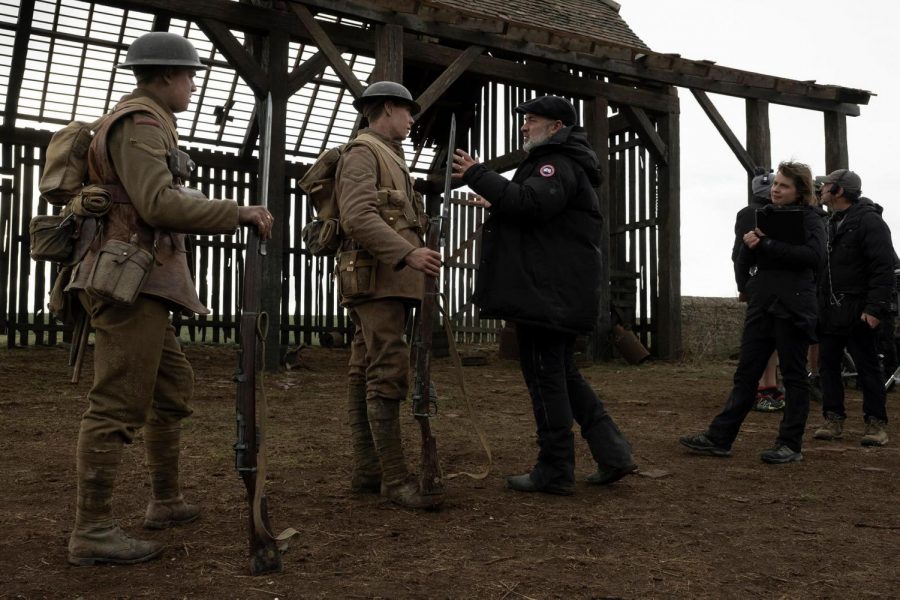“1917” Battles With a Lack of War Scenes
“1917” is an adventure-thriller movie, set on the frontline of the First World War, yet rarely depicts men at war. Instead, what director Sam Mendes has chosen to pursue is a more confined story: a narrative better suited for a duo than for a battalion. The movie begins with pudgy faced greenhorn Lance Corporal Blake (Dean-Charles Chapman) on reserve with his squadron when a superior officer mysteriously tells him to bring a friend and his rifle down to the trenches. Blake chooses Lance Corporal Schofield (George MacKay), a more experienced fighter already decorated for his valor.
The two are brought to see none other than their commanding general (Colin Firth), who quickly establishes the thrust of the remaining plot. Early air intelligence indicates that the German army abandoned its current positions. In response, the Second Battalion of the Devonshire Regiment, lead by Colonel Mackenzie (Benedict Cumberbatch), pursued the German forces and are geared for a charge to crack the enemy once and for all.
However, more recent intelligence has painted a drastically different picture where the Germans have not retreated, but strategically removed themselves to a new frontline so well-enforced that the attack of the Second Battalion would be tantamount to suicide.
As a parting gift, the Germans cut the telephone lines over their once occupied land. To warn the unknowing Second Battalion, the generals contract Blake and Schofield for a mission: cross no man’s land, walk through the abandoned German trenches and make their way up to Second Battalion. However, Blake’s older brother also serves as a Lieutenant under Col. Mackenzie; therefore, failure might mean his death, too.
Blake sets off at once, and for the first time here we see the central technical gimmick used in the best way. That gimmick is the myth of the one-shot take, where the entirety of the movie gives the illusion of having been filmed in just one long cut. What this actually means is that a number of lengthy, well-choreographed shots have been stitched together during moments of visual confusion.
However, the illusion works and is ideal for showing the roving vastness of the trenches, as well as for tracking movement through the winding frontlines. This is the use we see at first, with Mendes closely circling Blake and Schofield as they walk up the down trench and bump past shaken, rude soldiers, revealing to the camera an entire world of men hardened into living mud by many days of the war.
Mendes has not decided to make a movie about trench warfare or warfare at all, but a movie divorced from the confines of a reconnaissance adventure movie where the unbroken movie-image is used to the last of its potential to capture vast bloody infantry battles.
Scarcely is the pair of messengers traced through any actual chaos or anything very unpredictable. The sets revolve instead around emptiness, from the apocalyptically-shelled ruins of plains to the eerie green farmland devoid even of cattle (the Germans machine-gunned them while on their retreat), in an effort to breed suspense. This suspense manifests at times but fails to land at others.
The movie suggests, through the sentiments of more than one character, a general weariness and tiredness brought about by the three-year-long conflict, prophesizing mutual destruction between the sides where the victor is the last man standing.
It’s a fitting feeling for the time and place of the film, but the implied carnage and resulting cynicism is never properly shown on screen. This is because Mendes has decided to divorce his principal characters from the greater divisions of the army, ensuring that the viewer sees the shadowy underbelly of the war more than the over-the-top charging horrors of its every battle. The film isn’t ultimately weary and war-worn, but urgent.
The importance of getting to the message to Second Battalion is transformed into a deus ex machina that overrides the whole film into a story as unbelievable and improbable as it is inevitable, guided by the force of Blake and Schofield’s death-defying heroics. The trace of the war itself remains ever in the background, a distant memory.








































































































































































































